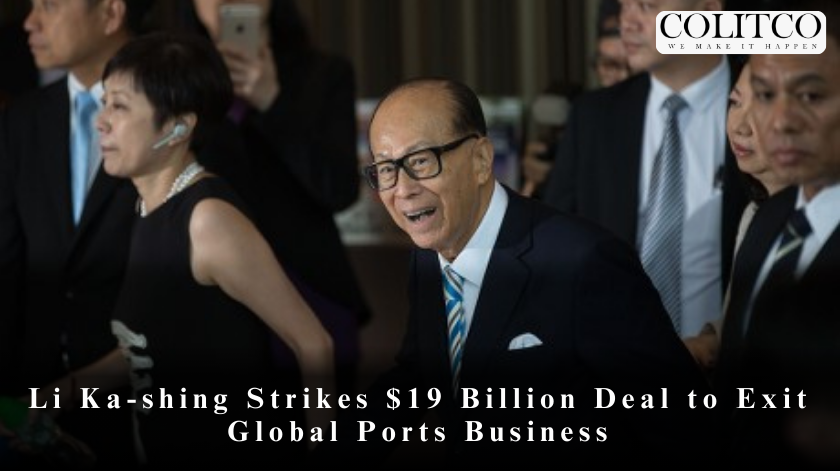Hong Kong’s richest man, Li Ka-shing, has once again demonstrated his deal-making prowess, orchestrating a $19 billion transaction to offload the bulk of his global ports business. The 96-year-old business magnate’s company, CK Hutchison Holdings Ltd., announced plans to sell its port assets to a consortium led by BlackRock Inc., marking one of the most significant divestments in Li’s career.
A Strategic Exit Amid Growing Pressures
The deal comes at a time when CK Hutchison’s control over ports at the Panama Canal had drawn scrutiny from the Trump administration. The U.S. government had expressed concerns over Chinese-linked companies operating key global trade infrastructure, increasing regulatory pressure on the conglomerate. By stepping away from the ports sector, Li Ka-shing has effectively avoided potential geopolitical roadblocks, securing a massive cash inflow while realigning his business focus.
Financial and Market Implications
With this sale, CK Hutchison is set to receive over $19 billion in cash, allowing the company to strengthen its balance sheet and explore new investment opportunities. Analysts believe the move could unlock value for shareholders, as the stock surged following the announcement. The deal also reflects BlackRock’s increasing appetite for infrastructure assets, as global investors seek stable, long-term returns in a volatile market.
Also Read: Trump’s Record-Breaking Speech to Congress: Key Takeaways and Policy Announcements
Li Ka-shing’s Legacy and Business Evolution
Li Ka-shing, often referred to as “Superman” for his investment acumen, has built a business empire spanning real estate, telecom, and infrastructure. While ports have been a cornerstone of his holdings for decades, his recent moves suggest a strategic pivot away from physical infrastructure towards higher-growth sectors such as technology and healthcare.
This is not the first time Li has reshaped his empire. In recent years, he has divested from traditional assets and expanded investments in Europe, particularly in telecommunications and energy. His visionary approach has allowed him to stay ahead of market trends, ensuring CK Hutchison remains a powerhouse in global business.
Geopolitical Underpinnings and Global Trade
The sale of CK Hutchison’s port business comes amid increasing geopolitical tensions between the U.S. and China, with infrastructure and trade routes becoming battlegrounds in global economic strategy. By handing control of the ports to a U.S.-backed consortium, Li has effectively defused potential conflicts while maintaining strong financial standing.
At the same time, the transaction underscores the shifting landscape of global trade and investment flows, where private equity and institutional investors are playing a larger role in critical infrastructure ownership. With BlackRock stepping in, the deal also signals a realignment of capital flows away from Chinese firms towards Western investment giants.
What’s Next for CK Hutchison?
With a significant cash reserve post-sale, CK Hutchison is now in a position to redeploy capital into new ventures. Analysts speculate the company could accelerate investments in digital infrastructure, AI, and biotech, sectors that promise higher growth and long-term returns.
For Li Ka-shing, the transaction represents another masterstroke in his legendary career, proving that even at 96, his business instincts remain as sharp as ever. Whether this signals his final major deal or the beginning of another transformative chapter remains to be seen, but one thing is certain—Li Ka-shing’s influence on global markets is far from over.












